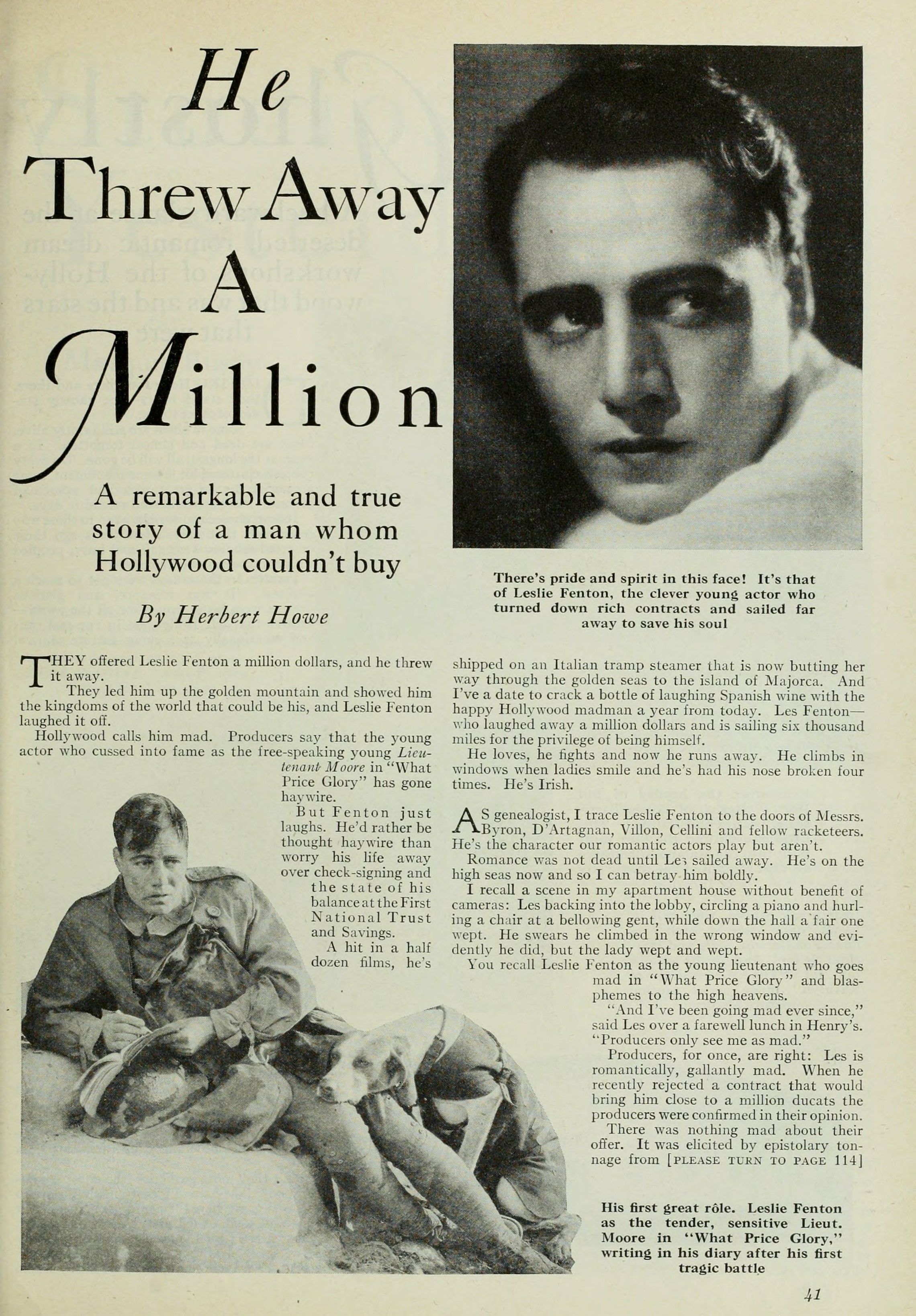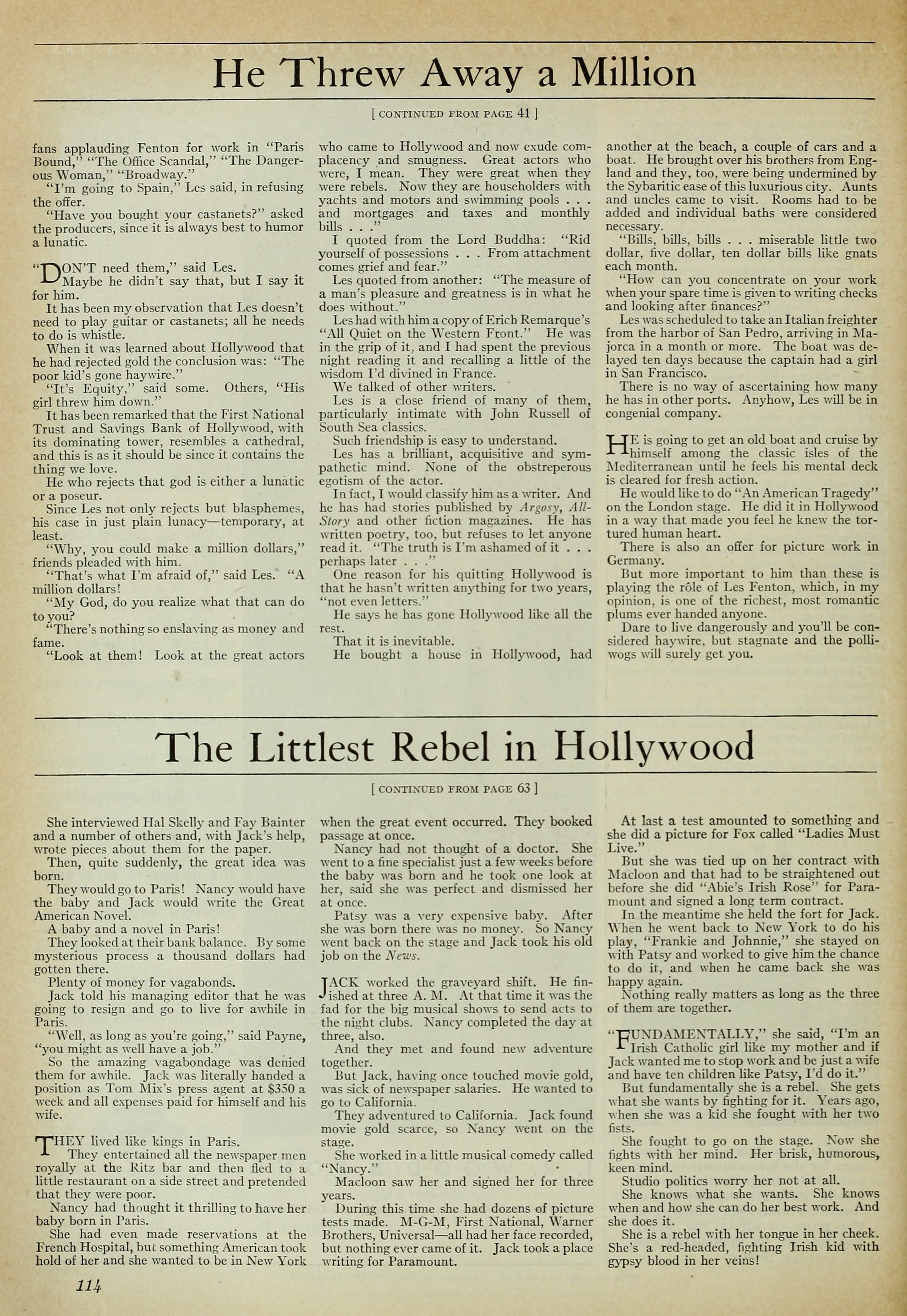Leslie Fenton — He Threw Away a Million (1929) 🇺🇸

They led him up the golden mountain and showed him the kingdoms of the world that could be his, and Leslie Fenton laughed it off.
by Herbert Howe
Hollywood calls him mad. Producers say that the young actor who cussed into fame as the free-speaking young Lieutenant Moore in What Price Glory? has gone haywire.
But Fenton just laughs. He’d rather be thought haywire than worry his life away over check-signing and the state of his balance at the First National Trust and Savings.
A hit in a half dozen films, he’s shipped on an Italian tramp steamer that is now butting her way through the golden seas to the island of Majorca. And I’ve a date to crack a bottle of laughing Spanish wine with the happy Hollywood madman a year from today. Les Fenton — who laughed away a million dollars and is sailing six thousand miles for the privilege of being himself.
He loves, he fights and now he runs away. He climbs in windows when ladies smile and he’s had his nose broken four times. he’s Irish.
As genealogist, I trace Leslie Fenton to the doors of Messrs. Byron, D’Artagnan, Villon, Cellini and fellow racketeers. He’s the character our romantic actors play but aren’t.
Romance was not dead until Les sailed away. He’s on the high seas now and so I can betray him boldly.
I recall a scene in my apartment house without benefit of cameras: Les backing into the lobby, circling a piano and hurling a chair at a bellowing gent, while down the hail a fair one wept. He swears he climbed in the wrong window and evidently he did, but the lady wept and wept.
You recall Leslie Fenton as the young lieutenant who goes mad in What Price Glory and blasphemes to the high heavens.
“And I’ve been going mad ever since,” said Les over a farewell lunch in Henry’s. “Producers only see me as mad.”
Producers, for once, are right: Les is romantically, gallantly mad. When he recently rejected a contract that would bring him close to a million ducats the producers were confirmed in their opinion. There was nothing mad about their offer. It was elicited by epistolary tonnage from fans applauding Fenton for work in “Paris Bound,” “The Office Scandal,” “The Dangerous Woman,” “Broadway.”
“I’m going to Spain,” Les said, in refusing the offer.
“Have you bought your castanets?” asked the producers, since it is always best to humor a lunatic.
“Don’t need them,” said Les.
Maybe he didn’t say that, but I say it for him.
It has been my observation that Les doesn’t need to play guitar or castanets; all he needs to do is whistle.
When it was learned about Hollywood that he had rejected gold the conclusion was: “The poor kid’s gone haywire.”
“It’s Equity,” said some. Others, “His girl threw him down.”
It has been remarked that the First National Trust and Savings Bank of Hollywood, with its dominating tower, resembles a cathedral, and this is as it should be since it contains the thing we love.
He who rejects that god is either a lunatic or a poseur.
Since Les not only rejects but blasphemes, his case in just plain lunacy — temporarily, at least.
“Why, you could make a million dollars,” friends pleaded with him.
“That’s what I’m afraid of,” said Les. “A million dollars!
“My God, do you realize what that can do to you?
“There’s nothing so enslaving as money and fame.
“Look at them! Look at the great actors who came to Hollywood and now exude complacency and smugness. Great actors who were, I mean. They were great when they were rebels. Now they are householders with yachts and motors and swimming pools… and mortgages and taxes and monthly bills…”
I quoted from the Lord Buddha: “Rid yourself of possessions… From attachment comes grief and fear.”
Les quoted from another: “The measure of a man’s pleasure and greatness is in what he does without.”
Les had with him a copy of Erich Remarque’s All Quiet on the Western Front. He was in the grip of it, and I had spent the previous night reading it and recalling a little of the wisdom I’d divined in France.
We talked of other writers.
Les is a close friend of many of them, particularly intimate with John Russell of South Sea classics.
Such friendship is easy to understand.
Les has a brilliant, acquisitive and sympathetic mind. None of the obstreperous egotism of the actor.
In fact, I would classify him as a writer. And he has had stories published by Argosy, All-Story and other fiction magazines. He has written poetry, too, but refuses to let anyone read it. “The truth is I’m ashamed of it… perhaps later…”
One reason for his quitting Hollywood is that he hasn’t written anything for two years, “not even letters.”
He says he has gone Hollywood like all the rest.
That it is inevitable.
He bought a house in Hollywood, had another at the beach, a couple of cars and a boat. He brought over his brothers from England and they, too, were being undermined by the Sybaritic ease of this luxurious city. Aunts and uncles came to visit. Rooms had to be added and individual baths were considered necessary.
“Bills, bills, bills… miserable little two dollar, five dollar, ten dollar bills like gnats each month.
“How can you concentrate on your work when your spare time is given to writing checks and looking after finances?”
Les was scheduled to take an Italian freighter from the harbor of San Pedro, arriving in Majorca in a month or more. The boat was delayed ten days because the captain had a girl in San Francisco.
There is no way of ascertaining how many he has in other ports. Anyhow, Les will be in congenial company.
He is going to get an old boat and cruise by himself among the classic isles of the Mediterranean until he feels his mental deck is cleared for fresh action.
He would like to do An American Tragedy on the London stage. He did it in Hollywood in a way that made you feel he knew the tortured human heart.
There is also an offer for picture work in Germany.
But more important to him than these is playing the role of Les Fenton, which, in my opinion, is one of the richest, most romantic plums ever handed anyone.
Dare to live dangerously and you’ll be considered haywire, but stagnate and the polliwogs will surely get you.

There’s pride and spirit in this face! It’s that of Leslie Fenton, the clever young actor who turned down rich contracts and sailed far away to save his soul
His first great role. Leslie Fenton as the tender, sensitive Lieut. Moore in What Price Glory?, writing in his diary after his first tragic battle

Collection: Photoplay Magazine, November 1929
